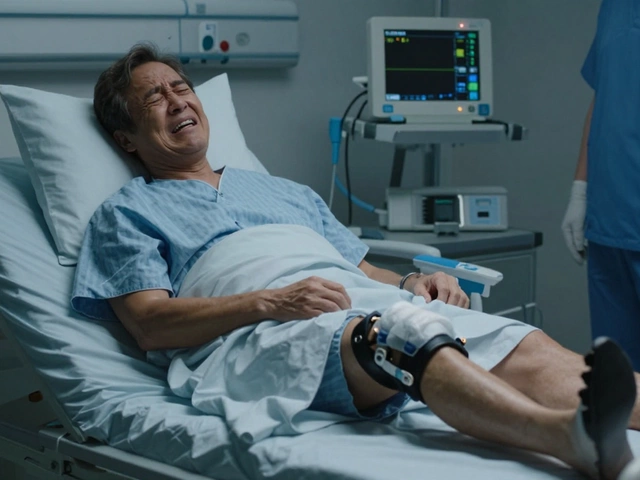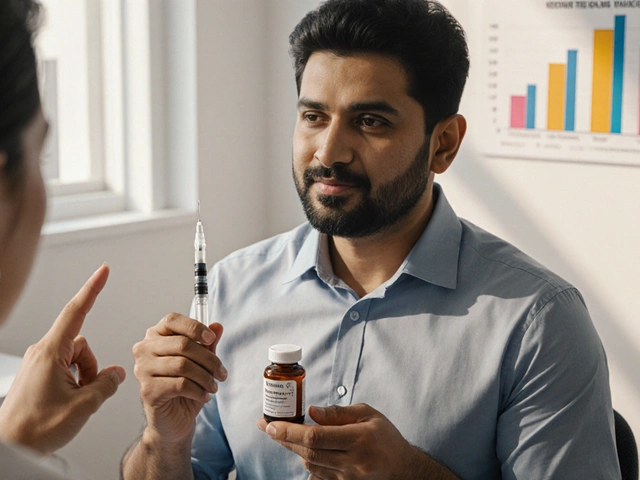Think you’re chained to a lifetime of pills because of diabetes? The idea that type 2 diabetes is a one-way street isn’t as ironclad as you’ve been told. Scientific breakthroughs, real-life transformations, and unconventional wisdom from around the world are rewriting what’s possible without metformin. Ready to peel back the labels and look at how you can really fix your diabetes?
What Actually Happens When You Ditch Metformin?
First, let’s be real about what metformin does. It lowers blood sugar by improving insulin sensitivity and reducing sugar production in your liver. It’s the go-to for type 2 diabetes, but it’s not the cure—more like a manager that keeps the chaos at bay. But does that mean you’re helpless without it? That depends a lot more on your choices than you think. Most people focus on blood sugar numbers, but the real drama is what goes on behind the scenes with your cells, your liver, your gut, and your habits.
People get nervous about ditching metformin, but doctors worldwide have weaned thousands of patients off it by helping them overhaul their lives. It’s not magic or wishful thinking; it’s about fixing the root causes. Research from Newcastle University in 2011 stunned the world by showing that people with type 2 diabetes achieved "remission"—blood sugar back to normal and off medications—by following a dramatic, calorie-controlled diet for just eight weeks. Their secret? The pancreas and liver fat levels plummeted, and beta cells started working again. It wasn’t voodoo; it was science.
Can you pull this off in real life without starving yourself? Actually, yes—you can. But it’s not just about calories; it’s about food timing, what you eat, how you move, and your daily routines. Ditching metformin, though, isn’t about throwing pills in the trash overnight. Talk with your doctor first. Sudden stops can mess with your blood sugar if you don’t have a battle plan. This journey is about stacking small wins that add up to a big result—the kind you feel in your energy, your sleep, and your blood sugar tracker.
And there’s more hope than ever. Worldwide, more doctors are starting to recognize that diabetes isn’t a static label. The American Diabetes Association recently admitted that “remission” is indeed possible for type 2 diabetes—even though it used to sound like a fantasy. If you take the right steps, your body can heal way more than you think.

The Lifestyle Overhaul: Food, Movement, and Mindset
Food is ground zero for diabetes. Not all carbs are evil, but if you’re eating white rice, bread, sweets, and sugary drinks every day, your blood sugar is going to swing like a roller coaster. One trick? Swap out empty carbs for high-fiber ones. Foods like lentils, beans, whole oats, and leafy greens take longer to digest and don’t spike sugar levels. The famous "DPP" clinical study showed that losing just 5-7% of your body weight can cut your diabetes risk in half—and keeping weight off is easier when you fill up on fiber and protein.
And let’s talk about meal timing. Intermittent fasting is getting tons of buzz for a reason. When you give your body a break from constant eating, your pancreas and liver have time to reset. In practical terms, try eating within an 8-to-10-hour window each day and stop snacking after dinner. This isn’t about skipping food; it’s about giving your hormones and blood sugar time to chill. If you really want to geek out, check out Dr. Jason Fung’s work. He’s helped people reverse diabetes with what he calls controlled "fasting," but it’s really just smarter eating windows.
Then comes movement. You don’t need to train for marathons. Even brisk walking, two to three times a day for 15 minutes after meals, can have a serious effect on post-meal blood sugar spikes. Resistance training matters too—it makes your muscles hungrier for glucose, pulling more sugar out of your bloodstream even hours after you’ve left the gym. If you’ve avoided exercise because you worry it’ll hurt your joints or make you tired, start small. Stand up, stretch, walk in place. Every bit helps.
Stress and sleep are game-changers that most people ignore. Chronic stress tells your liver to dump glucose into your blood, and lousy sleep messes with every hormone that controls appetite. Breathing exercises, yoga, even five minutes of nature time can drop your cortisol (the stress hormone) and help stabilize your readings. Journaling, meditation, and talking to someone about your stress are powerful. Sleep, though? Aim for 7-8 hours, and keep bedtime consistent. Studies from the University of Chicago show that one week of bad sleep can make you as insulin resistant as someone eating donuts for breakfast.
It’s not just theory. Listen to this from Dr. Roy Taylor, one of the world’s top diabetes researchers:
“The body has a remarkable ability to recover if you remove the cause of the problem—even after years of high blood sugar.”That’s gold. Your day-to-day wins add up. Small changes in food, movement, stress, and sleep do more to fix diabetes than any magic pill—even metformin.

Science-Backed Strategies and Surprising Diabetes Hacks
Ready for the nuts and bolts? Here’s where you get practical. Certain hacks—proven by research—work almost like cheat codes for bringing blood sugar down without drugs.
- Fix diabetes by building your plate around plants, lean proteins, and good fats. Add nuts, seeds, fish, eggs, and tons of color from veggies. Tomatoes, bitter gourd, okra, cinnamon, and even apple cider vinegar have track records of improving insulin sensitivity. Don’t just go by labels—whole food is your friend.
- Eat your carbs last. Study after study shows that when you eat veggies and protein first, followed by carbs, your blood sugar won’t jump as wildly.
- Add a squeeze of lemon or vinegar to meals—these acids slow the breakdown of starches. That’s why traditional meals in the Mediterranean and parts of Asia come with pickled sides or sour chutneys.
- Supercharge your gut. Fermented foods like yogurt, kefir, kimchi, and sauerkraut build healthy gut bacteria. One surprise: people with better gut health respond faster to lifestyle changes and manage diabetes better, according to Joslin Diabetes Center.
- Supplements don’t replace meals, but a few have real data behind them. Berberine, alpha-lipoic acid, and chromium have all been shown to help control blood sugar—but talk to your doctor before adding any supplement, especially if you take other meds.
- Hydrate more, sit less. When you feel thirsty, you’re already behind. Staying well-hydrated improves kidney function and prevents sugar buildup in your blood.
- Create a routine. Type 2 diabetes love structure. Predictable sleep and meals, regular activity, and screen-free wind-downs at night help your body recalibrate.
- Buddy up. Loneliness can actually make diabetes worse and demotivate you. Support from friends, family, or a diabetes group raises the odds of success by double digits in most research tracked by the CDC.
What about real people? Meet Harish, a 52-year-old engineer from Bengaluru. Two years ago, his doctor wanted to double his medication. Instead, Harish started daily walks, swapped white rice for millet, and stopped eating late at night. His HbA1c dropped from 8.4% to 5.6%, and his doctor weaned him off all meds. Or look at the transformation in a US pilot program where people followed a whole-food, plant-heavy plan. 60% reversed their diabetes within one year, verified by independent labs.
But here’s the catch: there’s no one-size-fits-all. Some people respond faster to diet, others need to nail down sleep or stress before the numbers move. The best plan is the one you can imagine still doing this time next year. Sustainability beats extremes, every single time.
So, if you’re ready to fix diabetes without metformin, remember—real change is possible right where you are today. The secret isn’t a shiny pill. It’s in your kitchen, your sneakers, your sleep routine, and how you deal with life’s headaches. Trust the process. People just like you have walked this path and come out healthier on the other side.






